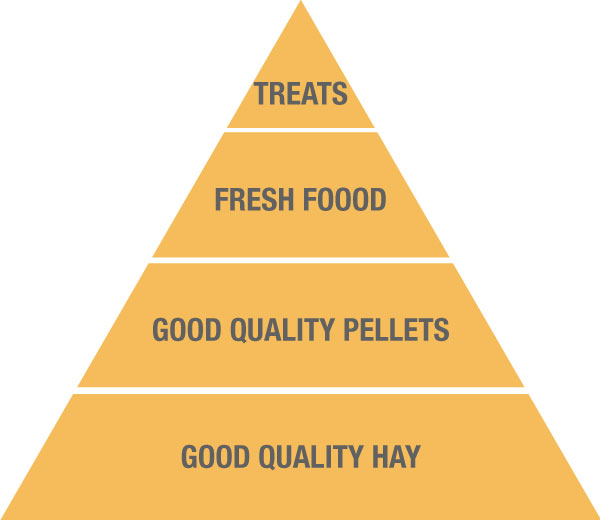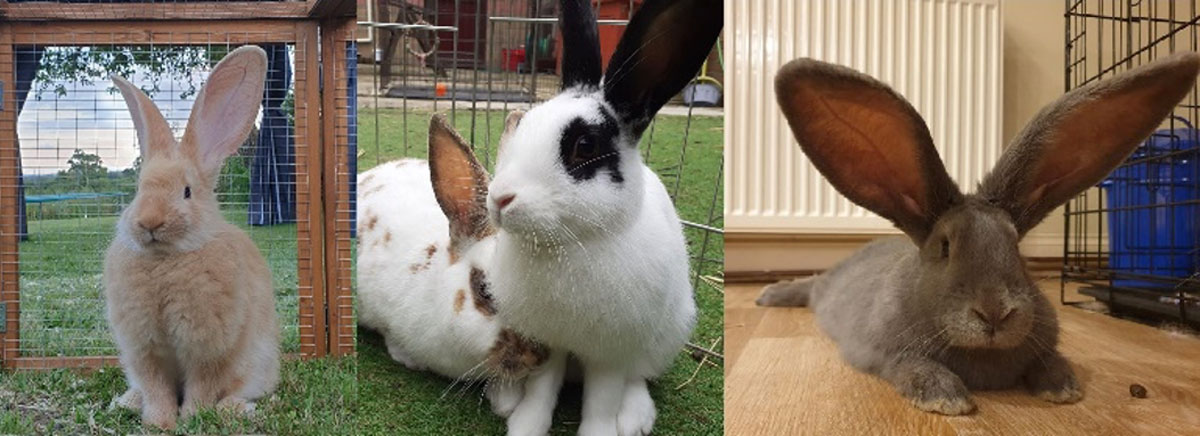Basic Rabbit Care
Housing
- Rabbits are very sociable and should be kept in neutered pairs or compatible groups. Groups should monitored for any signs of aggression.
- Rabbits and guinea pigs should not be kept together as they have different dietary requirements, can transmit diseases between them & rabbits can cause serious injury to guinea pigs.
- Rabbits are prey animals & can mask pain well/be nervous of new sounds and surroundings. This can make them skittish and fearful, so they should be handled carefully.
- Rabbits are very active animals, who sleep for short periods of time. They require large amounts of space to exercise in. Areas where a rabbit can forage will improve their enrichment and mirrors their natural behaviours.
- The RWAF advise that a rabbit’s total space should be 10ft by 6ft and at least 3ft tall. A hutch should be at least 6ft by 2ft by 2ft and be attached to an exercise run permanently, however if more space can be offered, this will be ideal.
- Rabbits can live indoors and outdoors. They are highly susceptible to temperature changes, so should not be kept somewhere that is not sheltered and/or has major temperature fluctuations. If kept indoors they should be away from radiators, drafts and windows.
- Rabbits should be given multiple areas to hide and play. Foraging areas, cardboard boxes, tunnels and hides provide enrichment for your pets.
Diet
 Rabbits are herbivores, their diet should consist primarily of good quality hay, grass, a variety of greens and limited amounts of pelleted food.
Rabbits are herbivores, their diet should consist primarily of good quality hay, grass, a variety of greens and limited amounts of pelleted food. - Muesli based Rabbit foods should not be fed as these encourage selective feeding and are usually low in fibre and high in calories.
- A Rabbit’s teeth are open rooted, meaning unlike ours they grow continuously.
- Long strands of good quality hay are important for their dental, digestive and mental health.
- Your rabbit’s water should be changed daily. Either a bottle or bowl can be used, or both. When bonding rabbits there should be multiple water and food sources to reduce the chance of conflict.
- You may notice that your rabbits eat some of their faeces. These are called caecotrophs. They are passed in addition to normal faeces and are consumed to maximise the extraction of all the nutrients from their fibrous diet.
Health
- Handling your rabbits daily will allow you to closely monitor them for any signs that they may require a visit to the vets. It will also get your rabbits used to being checked, and may improve your bond with them. As a prey species, rabbits may not enjoy being picked up, and often prefer interactions at ground level. You may find that your rabbit will come to you for attention if they feel comfortable enough.
- • Things to check include:
- Weight - Has there been a significant increase or decrease?
- Teeth - Are they misaligned, are they too long, does it look like there has been dribbling?
- Nails - Are they too long, are they curling?
- Coat - Is there any hair loss or matts, does the coat look dull? Check around the back end to ensure it is clean.
- Eyes - Are the eyes bright, is there any discharge?
- Nose - Is there any discharge or snuffles?
- An annual health check is recommended with an exotics vet, or rabbit savvy vet.
- • It is recommended to weigh your rabbits at least once a week, keeping a record will allow you to monitor for any changes, which may signal illness.
Vaccinations
- All rabbits, whether indoors or outdoors should be vaccinated at least once a year for Myxomatosis and the two strains of Viral Haemorrhagic Disease.
- Your rabbit can be vaccinated from 5 weeks old.
- The two vaccinations should be given 2 weeks apart and are only given if your pet is of perfect health, to ensure their immune system can respond properly to the vaccine.
- Rabbits at high risk should be vaccinated every 6 months (please discuss this with your vet if you believe your rabbit to be a high risk).
Neutering
Your rabbit can be neutered from 4-5 months old if female and usually around 3 months for males, or as soon as their testicles descend.
- Neutering your rabbit helps with behavioural issues, bonding and potential reproductive diseases and helps prevent uterine (very common in female rabbits) and testicular cancer.
Insurance
- We highly recommend taking out insurance for your Rabbit, to cover for veterinary fees in case of accident or illness.






